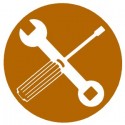Career Profile: Saddlery

Do you love horses? Chances are that if you do and you’ve done even a little riding, you know the importance of a good saddle. Horses are shaped in a very curved way, which means that making a saddle is a very technical and labored process. Saddle makers—or saddlers—create apparatuses that support the weight of the rider, provide comfort to both the horse and the rider, and show off some beautiful artwork. Saddlers have to be both technical in their work, and creative; they are artists.
Making saddles
Saddlery involves working with molds, cutting and sawing, sewing and stitching both on a machine and by hand, and creating designs that set you apart from other saddle makers. Saddlers join together leather parts—the higher quality the leather, the better—and follow specifications. Often, customers will have very specific requirements and requests concerning their saddles, and it is the job of the maker to meet those requirements while making a high-quality apparatus. The size of the saddle, grain of leather and colour must always be taken into consideration. Cushioning materials like cotton batting, mohair and foam rubber are added before the leather, and the saddler needs to know how to put in the right amount in order to achieve a well-balanced saddle.
Education
Saddlers must have graduated from high school or have the grade 12 equivalent. They must complete 5,440 hours of on-the-job and in-school training; this makes up the apprenticeship. Usually the in-school component is about 560 hours. A formal apprenticeship is not required, but it will help you when competing for jobs. This means working under an experienced saddler for on-hand training and experience. As saddlery is considered to be a Voluntary trade, the apprenticeship component is completely up to you. Just remember that experience is always best.
Saddlers must be reliable, detail oriented, and keen on business deals. Many saddlers end up managing their own business, so sometimes business classes can come in handy.
Salary
Harness makers in Canada can make a minimum wage of $20,378 to start, and up to $43,875, depending on working for a company or independently.
Source:





Laisser un commentaire!